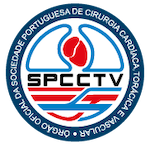TWELVE YEARS OF COMPLETE ATRIOVENTRICULAR SEPTAL DEFECT REPAIR
DOI:
https://doi.org/10.48729/pjctvs.101Abstract
Background: Surgical repair is the standard treatment for complete atrioventricular septal defect. At our institution, this repair is performed by single patch, modified single patch or two patch techniques, according to the surgeon preferences and the surgical anatomy of the defect. The goal of this study was to evaluate our results from the last twelve years.
Methods: From June 2006 to June 2018, 81 children with complete atrioventricular septal defect (without tetralogy of Fallot or unbalanced ventricles) were submitted to surgical repair at our institution. Data from all patients was retrospectively collected and evaluated.
Results: The average age was 6.9 ± 13.7 months and 84% had Down syndrome. Eighty percent were symptomatic and 6 patients were previously submitted to pulmonary artery banding. No more that mild left atrioventricular valve insufficiency was found in 84% and 89% of the patients, at discharge and follow-up, respectively. Small residual septal defects were present in 27% at discharge; during follow-up, 41% of these closed spontaneously. Pulmonary hypertension at discharge and follow-up appeared in 3.7% and 1.3%, respectively. Permanente pacemaker was implanted in 3 patients. Left ventricle outflow tract obstruction was found in 3 patients and 2 needed surgical correction. At follow-up (40 ± 38 months), 90% of the patients presented NYHA functional class I. No significant differences in the main repair outcomes were found between techniques, with the exception of small residual septal defects, although the groups were unmatched.
Conclusions: Overall and regardless of the technique used for the repair of complete AVSD, good early and midterm outcomes were achieved.
Downloads
References
Jacobs JP, Burke RP, Quintessenza JA, Mavroudis C. Congenital Heart Surgery Nomenclature and Database Project: Atrioventricular canal defect. Ann Thorac Surg 2000; 69:S36-S43.
Marino B. Congenital heart disease in patients with Down’s syndrome: Anatomic and genetic aspects. Biomed Pharmacother 1993; 47:197-200.
Karl TR, Provenzano SC, Nunn GR, Anderson RH. The current surgical perspective to repair of atrioventricular septal defect
with common atrioventricular junction. Cardiol Young 2010; 20(3):120-7.
Rastelli GC, Ongley PA, McGoon DC. Surgical repair of complete atrio-ventricular canal with anterior common leaflet
undivided and unattached to ventricular septum. Mayo Clin Proc 1969; 44:335-341.
Sabine H, Daebritz, MD. Correction of Complete Atrioventricular Septal Defects With Two Patch Technique. Oper Tech
Thorac Cardiovasc Surg 2004; 9:208-220.
Geoffrion TR, Singappuli K, Murala JSK. A review of the Nunn modified single patch technique for atrioventricular septal
defect repair. Transl Pediatr. 2018; 7(2):91-103.
Pan G1, Song L, Zhou X, Zhao J. Complete atrioventricular septal defect: comparison of modified single-patch technique
with two-patch technique in infants. J Card Surg 2014; 29(2):251-5.
Li D, Fan Q, Iwase T, Hirata Y, An Q. Modified Single-Patch Technique Versus Two-Patch Technique for the Repair of
Complete Atrioventricular Septal Defect: A Meta-Analysis. Pediatr Cardiol 2017; 38(7):1456-1464.
Xiong Y, Wang L, Liu W, Hankey GJ, Xu B, Wang S. The Prognostic Significance of Right Bundle Branch Block: A Meta-
-analysis of Prospective Cohort Studies. Clin Cardiol 2015; 38(10):604-13.
Harkness WT, Hicks M. Rhythm, Bundle Branch Block, Right (RBBB). StatPearls [Internet] 2018.
Harmandar B1, Aydemir NA, Karaci AR, Sasmazel A, Saritas T, Bilal MS, Yekeler I. Results for surgical correction of complete atrioventricular septal defect: associations with age, surgical era, and technique. J Card Surg. 2012 Nov;27(6):745-53.
Deraz S, Ismail M. Single patch technique versus double patch technique in repair of complete atrioventricular septal
defect. The Egyptian Heart Journal 2013. 66(2): 177-182.
Sivalingam S, Krishnasamy S, Al-Fahmi NA et al. Early and midterm outcome of complete atrioventricular septal defect
(AVSD) in a single institution. Indian J Thorac Cardiovasc Surg 2013. 29:223–229.
Atz AM, Hawkins JA, Lu M et al. Surgical management of complete atrioventricular septal defect: associations with surgical technique, age, and trisomy 21. J Thorac Cardiovasc Surg 2011. 141:1371–1379.
Pan G, Song L, Zhou X et al. Complete atrioventricular septal defect: comparison of modified single-patch technique with
two-patch technique in infants. J Card Surg 2014. 29:251–255.






